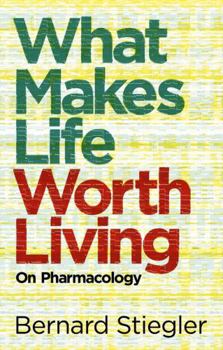What Makes Life Worth Living: On Pharmacology
Select Format
Select Condition 
Book Overview
In the aftermath of the First World War, the poet Paul Val rywrote of a 'crisis of spirit', brought about by theinstrumentalization of knowledge and the destructive subordinationof culture to profit. Recent events demonstrate all too clearlythat that the stock of mind, or spirit, continues to fall. Theeconomy is toxically organized around the pursuit of short-termgain, supported by an infantilizing, dumbed-down media. Advertisingtechnologies make relentless demands on our attention, reducing usto idiotic beasts, no longer capable of living. Spiralling rates ofmental illness show that the fragile life of the mind is atbreaking point.
Underlying these multiple symptoms is consumer capitalism, whichsystematically immiserates those whom it purports to liberate.Returning to Marx's theory, Stiegler argues that consumerismmarks a new stage in the history of proletarianization. It is nolonger just labour that is exploited, pushed below the limits ofsubsistence, but the desire that is characteristic of human spirit.
The cure to this malaise is to be found in what Stiegler calls a'pharmacology of the spirit'. Here, pharmacology hasnothing to do with the chemical supplements developed by thepharmaceutical industry. The pharmakon, defined as both cure andpoison, refers to the technical objects through which we openourselves to new futures, and thereby create the spirit that makesus human. By reference to a range of figures, from Socrates, Simondon and Derrida to the child psychoanalyst Donald Winnicott, Stiegler shows that technics are both the cause of our sufferingand also what makes life worth living.





